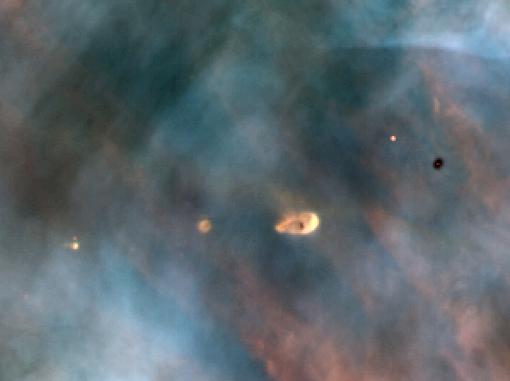Astrobiology: What's the point?
Interview with
If it's highly unlikely that we'll ever be able to detect intelligent life, should we  continue on in our efforts to find ET? Would the money, time and effort not be better directed elsewhere? Chris Smith put these questions to Eleanor Bacchus, Lewis Dartnell and Nick Lane, and started by asking Eleanor if there are any spin-off technologies from astrobiology developments...
continue on in our efforts to find ET? Would the money, time and effort not be better directed elsewhere? Chris Smith put these questions to Eleanor Bacchus, Lewis Dartnell and Nick Lane, and started by asking Eleanor if there are any spin-off technologies from astrobiology developments...
Eleanor - There's an awful lot of funding around for exoplanets at the moment because it's a really - well, it's a really trendy subject in astrophysics. There's a lot of grants for it and this is pushing our technology because it's such a difficult problem. It's pushing technology to sort of limits that people couldn't really imagine before and this has just spun off into medical uses as well. So, there are some of our telescope technology is actually used in looking at people's eyes. There's one of these that I came across that I wasn't aware of before which was pretty astounding.
Chris - It's ironic to think of turning the telescope around, isn't it?
Eleanor - Yeah.
Chris - We're taking something very powerful to look at something very miniscule. I think also, someone said to me that if it wasn't for astronomy and astrophysics, we wouldn't have Wi-Fi that we all use on the internet every day and of course the SKA, the Square Kilometer Array, world's most powerful telescope they're building. That's gonna generate as much data in a day as the whole world generates in a year at the moment, so we've got to marshal big data better. Nick Lane, what do you think about this whole business of looking for life out there? Do you think we should be looking for life in Cambridge, or we should be looking for life elsewhere in the universe?
Nick - Yeah. I think, I think it's overwhelmingly likely that life will arise on more or less any wet rocky planet, including Mars. I would agree with Lewis. I would be very disappointed if it hadn't, but complex life like ourselves, I think that's far, far more rare. All complex life on Earth only arose once in 4 billion years and so that's highly improbable for whatever reasons that we're trying to understand. Should we therefore look for complex life out in the rest of the universe? I would say, yes, because we don't understand what the reasons are here. We're trying to get at it but again, observational data is the only that's going to give us any kind of an answer.
Chris - And Lewis Dartnell, thirty seconds. So, SETI? Yes or no?
Lewis - My personal belief is that SETI will not detect anything. There is no other intelligent civilization in our galaxy. However, I think we should still be looking for it because it's an incredibly cheap thing to do but the repercussions would be so incredibly profound if we find an interstellar text message tomorrow.
- Previous Harnessing wind and wave power
- Next Mussels solve sticky problem









Comments
Add a comment